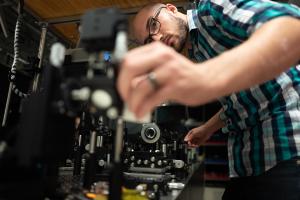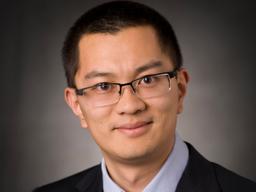Graduate Programs

Mechanical engineering is one of the largest, broadest, and oldest engineering disciplines. Mechanical engineers use the principles of energy, materials, and mechanics to design, analyze, optimize and manufacture machines and devices of all types and scales. They create the processes and systems that drive technology and industry. Aerospace engineering is a highly specialized, yet widely diverse field. Aerospace engineers develop innovations and technologies for use in aviation, defense systems, and space exploration.
Our Graduate Programs
-
Ph.D. in Mechanical & Aerospace Engineering
The Ph.D. degree is a research degree requiring independent research as reported in a final defense.
-
M.S. in Mechanical & Aerospace Engineering
The master of science is a research degree requiring independent research as reported in a final thesis.
-
M.E. in Mechanical & Aerospace Engineering
The master of engineering degree is a course-based degree with no research requirement. In addition to the residential M.E. degree, there is an online learning option available for the M.E. degree through Virginia Engineering Online (VEO).
Graduate Certificate in Cyber-Physical Systems
The graduate certificate in cyber-physical systems (CPS) is designed to recognize the acquisition of CPS knowledge and skills through the completion of targeted courses.
Resources for Current Students
-
UVA Engineering Graduate Student Resources
Explore our resources for graduate students, including professional development support and ways to get involved at UVA Engineering.
-
Academic Planning
Find timelines, forms and guidance for completing your degree on schedule.
Upcoming Events
See All Events-
Time: 3:30 PM - 4:30 PMLocation: Olsson 001
-
"UVA Engineering's rigorous curriculum, coupled with my experience as an undergraduate research assistant, convinced me to enroll as a graduate student."
 Ayodeji Bode-Oke
Mechanical Engineering Classes of 2015 and 2019
Ayodeji Bode-Oke
Mechanical Engineering Classes of 2015 and 2019
Multi-disciplinary Approach
Flexibility exists within our curriculum for multi-disciplinary research and a significant number of courses can be taken outside of MAE. The curriculum is designed to accommodate non-traditional students with undergraduate degrees in other scientific or engineering fields. It is expected that all applicants will have completed a calculus-based physics course and college mathematics through differential equations.
Research
Research in the solid mechanics area includes studies in: collision/injury mechanics, complex nonlinear simulation restraint optimization, morphing structures, polymer electromechanical devices (PEMs), mechanics of soft materials, neuromuscular biomechanics, movement disorders, musculoskeletal modeling and simulation. Research in dynamical systems and control covers a wide range of problems of practical interest including vibration control, rotor dynamics, magnetic bearings, mechatronics, fluid control, and the use of periodicity to enhance the achievable performance of controlled systems. Research in thermofluids includes topics from micro-scale and non-Fourier heat transfer, combustion (including supersonic), reduced-order chemical kinetics, thermoacoustics, aerogels, low-speed unsteady aerodynamic flows, atmospheric re-entry flows, supersonic mixing, flows in liquid centrifuges, flow in centrifugal pumps, turbomachinery flows, hydrodynamic stability, multi free-surface flows, non-Newtonian fluid mechanics, flow/structure interactions, and free and forced convection. More about MAE research.
Facilities
The department’s mechanical and aerospace research facilities include a rotating machinery and controls laboratory; several subsonic wind tunnel laboratories; a supersonic combustion laboratory; a supersonic wind tunnel laboratory; the center for applied biomechanics; the bio-inspired engineering and research lab, the aerospace research lab; a nano-scale mechanics and materials characterization laboratory; a bio thermofluids laboratory; a nano-scale energy transfer laboratory; a control systems laboratory; and an aerogel laboratory. Several of these laboratories are unique among all universities in the world. More about MAE facilites.
